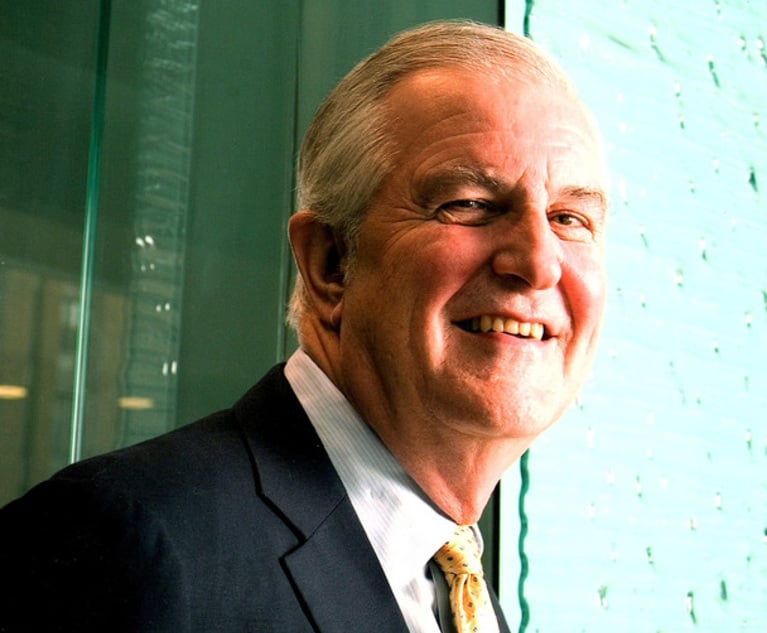 Saul Ewing Arnstein & Lehr in Miami.
Saul Ewing Arnstein & Lehr in Miami.Head Count Growth Drives Revenue Gains at Saul Ewing as Firm's Footprint Spreads
Still adjusting to a 2017 merger that brought the firm a Midwest and Florida presence, Saul Ewing also added a Minneapolis group in 2019.
February 18, 2020 at 02:04 PM
5 minute read
The original version of this story was published on The Legal Intelligencer
In a year when it continued to grow its Midwest footprint and wrapped up integration efforts from a major merger ahead of schedule, Saul Ewing Arnstein & Lehr saw its revenue and head count grow in parallel in 2019.
The Am Law 200 firm grew gross revenue by 5.2% in 2019, to $239.1 million, compared with $227.3 million in 2018. Revenue per lawyer increased by less than 1%, growing from $623,000 to $628,000 in 2019.
Firmwide, profits grew only slightly, with net income of $71.6 million beating 2018 net income by 1.1%. But as the equity partner tier shrank by two lawyers, profits per equity partner increased 2.3% to $616,000.
Rates across the firm increased by about 3% on average in 2019, managing partner and CEO Barry Levin said.
 Levin said the firm beat its budget by more than 15%—noting that its own measure for making budget is not tied to Am Law 200 metrics—and prepaid expenses for 2020. He said the partnership was "thrilled" with 2019 performance.
Levin said the firm beat its budget by more than 15%—noting that its own measure for making budget is not tied to Am Law 200 metrics—and prepaid expenses for 2020. He said the partnership was "thrilled" with 2019 performance.
Looking back on Saul Ewing's 2017 merger with Chicago-based midsize firm Arnstein & Lehr, Levin said "we've completed integration two years ahead of schedule," noting that "we merged with a firm that had very different data." He said he expects the firm's financial gains to be greater going forward.
Expenses related to that integration included standardizing compensation across the firm, and increasing associate salaries. Saul Ewing and Arnstein & Lehr had different compensation structures before merging, Levin explained.
Other 2019 investments not necessarily tied to the 2017 expansion included improving technology and data security and updating office space, which is an ongoing effort. The firm is moving toward same-size lawyer offices with more collaborative space, Levin said. It did so in Miami and New York already—though the latter office will continue to experience some changes in the future—and it plans to do so in Baltimore this year.
As it continued to fold in the moving parts of the 150-lawyer firm it combined with two years before, Saul Ewing also opened a new office in Minneapolis with eight lawyers, which has now grown to a group of 15.
That group came from midsize firm Gray Plant Mooty, which has since merged with Am Law 200 firm Lathrop Gage. Levin said Saul Ewing paid for the Minneapolis expansion out of operating revenue and that the new office finished 2019 ahead of projections.
Including the new Minneapolis group, Saul Ewing's total head count grew 4.4%, from 365 to 381 lawyers on a full-time equivalent basis, while the partnership as a whole went from 201 to 211. That included a 13.1% increase in the number of nonequity partners and a 1.7% decrease in the equity tier, to 116.
Levin said the firm did intentionally shrink its equity partner tier, which it refers to as percentage partners. The decrease, he said, resulted from some senior partner retirements. He noted that all partners in both tiers pay in capital and vote on firm matters.
While the equity partner tier was smaller on a net basis, the firm promoted eight lawyers to percentage partner, he said, and four of them were women. Overall, 27 lawyers were promoted to partner or counsel last year, Levin said.
Levin said the firm has changed its process for selecting new partners and leaders to fit its Mansfield certification, and it is focusing on further diversity education within the firm. He noted that four new office managing partners were named in 2019, three of whom are African American and one of whom is Hispanic.
"We're proud of the progress we've made, but we're not satisfied," he said.
Asked about practices that performed well in 2019, Levin noted work for corporate clients in various practice areas. In M&A, he noted Saul Ewing's work on the merger of International Speedway into NASCAR, a $2 billion deal. In restructuring, the firm is debtors counsel for Hahnemann Hospital, and it's serving as the Delaware counsel to unsecured creditors in the Forever 21 bankruptcy. He also noted several public-private partnerships the firm is working on involving hotels partnered with public entities, like colleges.
Levin said the investigations practice has been particularly active across industries including higher education, manufacturing, energy, consumer products and life sciences, as well as investigations for government clients. The firm is working for the Baltimore city in Maryland as it investigates a ransomware attack that took place last year.
In 2020, Levin said, the firm will continue to invest in white-collar, corporate and transactional and litigation practices. He said he's not expecting a recession in the near future, though the outcome of the 2020 presidential election could be a turning point for the economy and the legal industry.
As for other cities where the firm may expand, he did not hint at any specific plans. But he noted that Texas; Phoenix, Arizona; and other locations in the Southwest continue to be hot destinations for large law firms.
"I love what we did in Minneapolis," Levin said, referring to the acquisition of a smaller but substantial group of lawyers with an established practice. "I could see doing that in another market or two."
This content has been archived. It is available through our partners, LexisNexis® and Bloomberg Law.
To view this content, please continue to their sites.
Not a Lexis Subscriber?
Subscribe Now
Not a Bloomberg Law Subscriber?
Subscribe Now
NOT FOR REPRINT
© 2025 ALM Global, LLC, All Rights Reserved. Request academic re-use from www.copyright.com. All other uses, submit a request to [email protected]. For more information visit Asset & Logo Licensing.
You Might Like
View All
Demand Growth to 'Likely Weaken' in 2025 After 'Anomalies' Propelled Big Law Profits in 2024
5 minute read


Capital Markets Partner Rejoins O’Melveny Ahead of Expected Uptick in Demand
Law Firms Mentioned
Trending Stories
- 1DC's Birchstone Moore Combines With Chicago-Founded Wealth Planning Firm
- 2White Castle GC Becomes Chain's First President From Outside Family
- 3Braverman Greenspun Acquires NY Real Estate Boutique
- 4Winston & Strawn Snags Sidley Austin Cross-Border Transactions Partner in Miami
- 5U.S. Attorney Markenzy Lapointe Stepped Down
Who Got The Work
Michael G. Bongiorno, Andrew Scott Dulberg and Elizabeth E. Driscoll from Wilmer Cutler Pickering Hale and Dorr have stepped in to represent Symbotic Inc., an A.I.-enabled technology platform that focuses on increasing supply chain efficiency, and other defendants in a pending shareholder derivative lawsuit. The case, filed Oct. 2 in Massachusetts District Court by the Brown Law Firm on behalf of Stephen Austen, accuses certain officers and directors of misleading investors in regard to Symbotic's potential for margin growth by failing to disclose that the company was not equipped to timely deploy its systems or manage expenses through project delays. The case, assigned to U.S. District Judge Nathaniel M. Gorton, is 1:24-cv-12522, Austen v. Cohen et al.
Who Got The Work
Edmund Polubinski and Marie Killmond of Davis Polk & Wardwell have entered appearances for data platform software development company MongoDB and other defendants in a pending shareholder derivative lawsuit. The action, filed Oct. 7 in New York Southern District Court by the Brown Law Firm, accuses the company's directors and/or officers of falsely expressing confidence in the company’s restructuring of its sales incentive plan and downplaying the severity of decreases in its upfront commitments. The case is 1:24-cv-07594, Roy v. Ittycheria et al.
Who Got The Work
Amy O. Bruchs and Kurt F. Ellison of Michael Best & Friedrich have entered appearances for Epic Systems Corp. in a pending employment discrimination lawsuit. The suit was filed Sept. 7 in Wisconsin Western District Court by Levine Eisberner LLC and Siri & Glimstad on behalf of a project manager who claims that he was wrongfully terminated after applying for a religious exemption to the defendant's COVID-19 vaccine mandate. The case, assigned to U.S. Magistrate Judge Anita Marie Boor, is 3:24-cv-00630, Secker, Nathan v. Epic Systems Corporation.
Who Got The Work
David X. Sullivan, Thomas J. Finn and Gregory A. Hall from McCarter & English have entered appearances for Sunrun Installation Services in a pending civil rights lawsuit. The complaint was filed Sept. 4 in Connecticut District Court by attorney Robert M. Berke on behalf of former employee George Edward Steins, who was arrested and charged with employing an unregistered home improvement salesperson. The complaint alleges that had Sunrun informed the Connecticut Department of Consumer Protection that the plaintiff's employment had ended in 2017 and that he no longer held Sunrun's home improvement contractor license, he would not have been hit with charges, which were dismissed in May 2024. The case, assigned to U.S. District Judge Jeffrey A. Meyer, is 3:24-cv-01423, Steins v. Sunrun, Inc. et al.
Who Got The Work
Greenberg Traurig shareholder Joshua L. Raskin has entered an appearance for boohoo.com UK Ltd. in a pending patent infringement lawsuit. The suit, filed Sept. 3 in Texas Eastern District Court by Rozier Hardt McDonough on behalf of Alto Dynamics, asserts five patents related to an online shopping platform. The case, assigned to U.S. District Judge Rodney Gilstrap, is 2:24-cv-00719, Alto Dynamics, LLC v. boohoo.com UK Limited.
Featured Firms
Law Offices of Gary Martin Hays & Associates, P.C.
(470) 294-1674
Law Offices of Mark E. Salomone
(857) 444-6468
Smith & Hassler
(713) 739-1250








